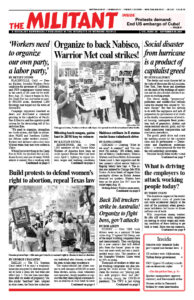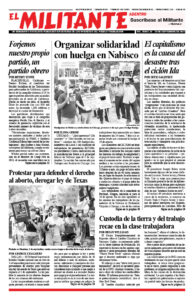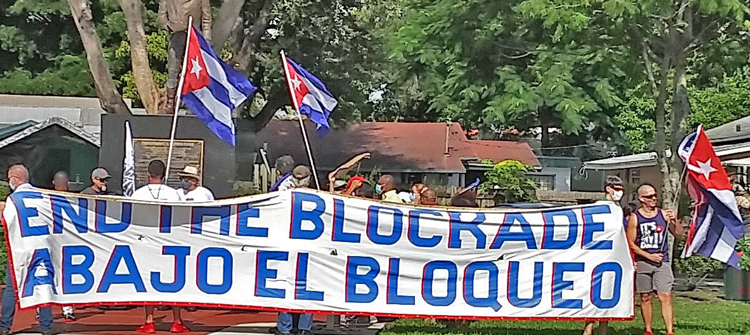Car and bike caravans along with pickets and rallies protesting Washington’s more than 60-year-long economic war against Cuba’s socialist revolution took place in at least half a dozen U.S. cities, as well as in Canada, the United Kingdom and other countries Aug. 29. These monthly caravans, which began last year, have won new support to the fight to overturn the U.S. government embargo.
The actions take on greater importance as the Joseph Biden administration has been ratcheting up the U.S. rulers’ economic and political assault against Cuba, claiming they are defending democracy. They build on and expand measures imposed by Donald Trump’s administration and all others before him since workers and farmers took power in Cuba in 1959. And the effects of the punishing embargo are exacerbated by today’s worldwide capitalist economic crisis and the COVID-19 pandemic.
In Miami, reports Nelson Gonzalez, more than 50 people joined in a caravan of 50 cars to demand an immediate end to the embargo. In a show of solidarity with the Haitian people, the caravan ended up at a Little Haiti neighborhood park. Caravan participants donated $438 to Haiti’s earthquake relief effort. “Both Cuba and Haiti have been oppressed by the U.S. government,” Adriana Ruiz, a caravan participant, told the Militant. “Cuba has always supported the Haitian people, including sending doctors and medicines.”
In Chicago, reports John Hawkins, 30 people in 21 cars caravanned on the city’s South Side. Among those joining for the first time were members of the United Steelworkers and the National Association of Letter Carriers.
‘Guantánamo belongs to Cuba’
In Seattle, reports Rebecca Williamson, some 35 people held a lively picket on a busy street at Green Lake Park. The U.S. rulers “don’t care about democratic rights, like they told us we were fighting for,” said Dan Gilman, a retired U.S. Army veteran who joined the action as part of a delegation from Veterans for Peace. “They need to close Guantánamo and give it back to Cuba!”
These monthly actions have won new individuals and groups to join in protesting the U.S. rulers’ assaults on Cuban sovereignty.
In Schenectady, New York, reports Laura Anderson, a dozen people participated in a caravan through a working-class neighborhood. Participants included members of Albany-Cuba Solidarity and two young workers joining a caravan for the first time. “The U.S. embargo against Cuba is inhumane,” said Charlie Bechtold, participating on his second caravan. “We drive through the community with our message on our cars and get a lot of positive reactions.”
“We need to continue educating working people in this country about the socialist revolution in Cuba, which is what Biden and every other president that came before is seeking to destroy,” said Róger Calero, Socialist Workers Party candidate for mayor of New York, at an Aug. 29 speakout against the embargo in East Harlem. Some 35 people gathered at the site of the “Dos Alas” mural depicting Puerto Rican independence fighter Pedro Albizu Campos and Cuban revolutionary leader Ernesto Che Guevara. Opponents of Cuba’s socialist revolution have been leading a charge to remove the mural, and it was recently defaced by right-wingers.
“We’re beginning to see more strikes going on,” said Calero. “It’s among these workers engaged in struggle that we will find allies for the fights in defense of Cuba’s socialist revolution and Puerto Rico’s independence: from coal miners in Alabama and Nabisco workers on strike to truck drivers and others fighting in Puerto Rico.”
Actions also took place in Washington, D.C.; Los Angeles; Dallas; and New Haven, Connecticut.
From Montreal, Katy LeRougetel reports that 17 carloads of people set off from a downtown park Sept. 5. They drove to the U.S. Consulate with signs demanding an end to the U.S. economic war on Cuba.
“I led a most beautiful childhood in Cuba. Cuba deserves to live without the blockade,” said Ailin Serrano, who was participating in her first caravan.
The previous weekend, a similar number joined a caravan in Vancouver, British Columbia. There was also a caravan in Ottawa, Ontario. “The sanctions punish the Cuban people — farmers, workers, children and old people that need care,” Luis Peral, originally from Cuba and now living in Vancouver, told the Militant. “It’s the common people of Cuba that made the revolution. The U.S. doesn’t want us to know that.”
In the working-class area of Brixton, in south London, reports Jonathan Silberman, 20 people organized a protest with colorful banners reading “Hands off Cuba — End the blockade — End British complicity.” Among those stopping by to talk was Alexis Cobian, a doctor, originally from Guantánamo in Cuba, who said he was “delighted” to see the protest.
In Hyde, England, 100 people participated in a meeting and fiesta at The Sportsman pub Aug. 28, reports Ögmundur Jónsson. It was organized by the Cuba Solidarity Campaign and Cubanos en Manchester. Among those attending were workers from the Pilgrim’s Pride meat factory in nearby Dukinfield, from the Piccadilly train station and local residents who frequent the pub. Trade unionists included Unite union members at bus company Go North West who had fought a three-month strike earlier this year, as well as members of Unison, Community and the Rail, Maritime and Transport Workers union.
Cuban Ambassador to the U.K. Bárbara Montalvo Álvarez described how the Cuban government has organized to resist the stepped-up U.S. economic and political offensive and conditions imposed by the pandemic. “We had to develop our own vaccines,” she said. U.N. program Covax “would only have covered 20% of the population. And we don’t have the money to buy vaccines on the world market.”
The government reports 90% of Cuba’s population will be fully vaccinated by the end of November.
“I hadn’t realized how serious the embargo was and how long it’s gone on for,” bus driver Carl Walmsley said after the program. “I was impressed by what I learned about the resilience of the Cuban people.”
To find out about future caravan actions, contact the National Network on Cuba at nnoc.info or Militant distributors listed in the Directory.


